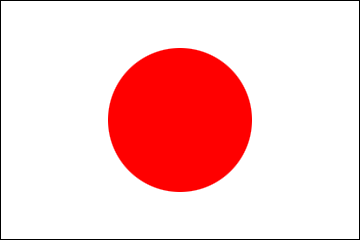Consulate Activities
2022/11/22
Reception for the Japan-U.S. Military Program (JUMP)
On Monday, November 14, 2022, the Consulate-General of Japan in Honolulu, the Japan-America Society of Hawaii, the Sasakawa Peace Foundation USA and the National Association of Japan-America Societies (NAJAS) co-hosted the Japan U.S. Military Program (JUMP) reception at the Official Residence of the Consul General of Japan in Honolulu. The purpose of the event was to foster a networking relationship with U.S. military active duty service members and veterans who have previously served in Japan.
In his opening remarks, Consul General Yutaka Aoki welcomed guests to the third JUMP reception and expressed his gratitude to the guests who have been serving the U.S.-Japan alliance, including U.S. military service members who were stationed in Japan, and for their dedication to maintain peace and security in the Indo-Pacific region.
Dr. Satohiro Akimoto, Chairman and President of Sasakawa USA gave an overview of the JUMP program. Dr. Akimoto explained that the U.S.-Japan alliance is becoming increasingly important amid the Ukraine crisis and the geopolitical situation in the East Asia region, underscoring the significance of the JUMP program.
ADM John C. Aquilino, Commander, U.S. Indo-Pacific Command, delivered the keynote speech. ADM Aquilino stated that he is committed to strengthening the U.S.-Japan alliance to maintain peace and security in the region, as the region faces the most severe international situation since World War II. He also welcomed the commander and crew who sailed into Honolulu on the Japan Maritime Self Defense Force’s submarine JS Toryu.
Minister Motosada Matano, Head of Political Affairs Department, Embassy of Japan, Washington, D.C., touched on Hawaii’s geopolitical importance and the current situation in the Indo-Pacific region. Mr. Matano also mentioned that the high-level bilateral dialogues taking place between Japan and the United States, and explained Japan’s security and defense policies. He also stressed the power of human connections.
Everyone in attendance that evening, the active U.S. military service members and veterans who served in Japan, the service members and government officers who work for Japan-related issues in Hawaii, think tank scholars and fellows, the commander and crewmembers of the JS Toryu, , all helped to deepen the personal connections as part of the U.S.-Japan alliance.
In his opening remarks, Consul General Yutaka Aoki welcomed guests to the third JUMP reception and expressed his gratitude to the guests who have been serving the U.S.-Japan alliance, including U.S. military service members who were stationed in Japan, and for their dedication to maintain peace and security in the Indo-Pacific region.
Dr. Satohiro Akimoto, Chairman and President of Sasakawa USA gave an overview of the JUMP program. Dr. Akimoto explained that the U.S.-Japan alliance is becoming increasingly important amid the Ukraine crisis and the geopolitical situation in the East Asia region, underscoring the significance of the JUMP program.
ADM John C. Aquilino, Commander, U.S. Indo-Pacific Command, delivered the keynote speech. ADM Aquilino stated that he is committed to strengthening the U.S.-Japan alliance to maintain peace and security in the region, as the region faces the most severe international situation since World War II. He also welcomed the commander and crew who sailed into Honolulu on the Japan Maritime Self Defense Force’s submarine JS Toryu.
Minister Motosada Matano, Head of Political Affairs Department, Embassy of Japan, Washington, D.C., touched on Hawaii’s geopolitical importance and the current situation in the Indo-Pacific region. Mr. Matano also mentioned that the high-level bilateral dialogues taking place between Japan and the United States, and explained Japan’s security and defense policies. He also stressed the power of human connections.
Everyone in attendance that evening, the active U.S. military service members and veterans who served in Japan, the service members and government officers who work for Japan-related issues in Hawaii, think tank scholars and fellows, the commander and crewmembers of the JS Toryu, , all helped to deepen the personal connections as part of the U.S.-Japan alliance.
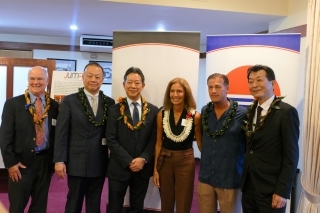 Admiral John C.Aquilino, Mrs. Laura and Co-Hosts
Admiral John C.Aquilino, Mrs. Laura and Co-Hosts
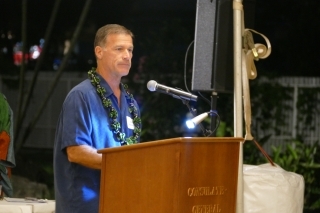 Keynote Speech by Admiral John C. Aquilino
Keynote Speech by Admiral John C. Aquilino
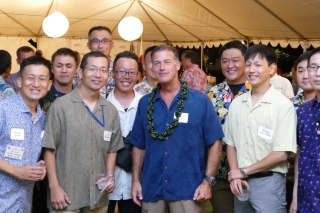 Admiral John C. Aquilino and Crew of JS Toryu
Admiral John C. Aquilino and Crew of JS Toryu
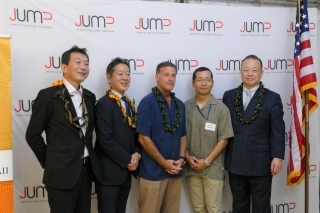 Admiral John C. Aquilino, Commandar of JS Toryu and Co-hosts
Admiral John C. Aquilino, Commandar of JS Toryu and Co-hosts
